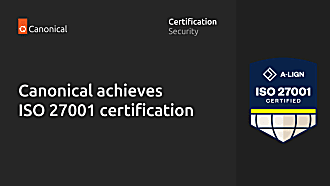James Nunns
on 21 November 2018

Security, regulations and compliance are everyday issues for businesses, whether global or not.
HIPAA, GDPR, MiFID II, and a whole host of other regulations, security and compliance demands are shaping the way businesses operate and the technologies that they can use.
Although technological choices are not always able to completely solve particular regulatory or compliance hurdles, they are capable of easing the path to being a compliant business, say for PCI for example.
In other cases, technology can provide peace of mind. Take GDPR, it has become one of the most hotly debated regulatory issues in recent history. GDPR has touched people of all walks of life, many of whom would never have thought it applicable to them. Many of those that hold GDPR responsibilities choose to run older versions of the Ubuntu operating system on their servers, with LTS and ESM, Ubuntu makes sure that those older versions are covered, while technologies such as Landscape can help ensure that there is no case for gross negligence under GDPR if you are hacked, because it will have ensured the latest patches are in place.
For Ubuntu, helping our customers to be compliant, meet regulatory requirements, and helping them to be secure is built into everything that we do because we know that protecting your customers and avoiding the significant financial and reputational ramifications that threaten non-compliant organisations, is a must, and this starts with the technology powering your enterprise.
Ubuntu’s security and compliance solutions are at the forefront of solving complex security and compliance issues globally.
To learn more about Ubuntu’s security portfolio, join our webinar on November 28th for information on:
- Compliance and security issues heading into 2019.
- How Ubuntu is securing the most heavily regulated industries, such as: government, financial services & healthcare.
- A guide to security & compliance on Ubuntu, including dealing with GDPR, why FIPS matters and why compliance doesn’t have to come at a high price.



